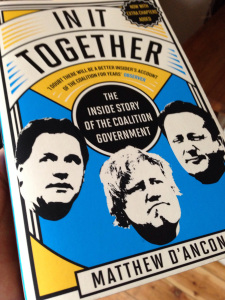 If you have the slightest interest in the Conservative-Liberal Democrat coalition government, this book is essential reading. It explains how the coalition came about (and how much secret preparation had been made in the run-up to the 2010 election despite public disavowals) and how it continued to exist despite some severe internal and external pressure.
If you have the slightest interest in the Conservative-Liberal Democrat coalition government, this book is essential reading. It explains how the coalition came about (and how much secret preparation had been made in the run-up to the 2010 election despite public disavowals) and how it continued to exist despite some severe internal and external pressure.
He has a very wry and witty way that turn some sentences into slogans, for example on the way that politicians find things to say and do when the cameras are on them:
But politicians are like quantum particles: they respond to observation.
As you’d expect from a former editor of the Spectator, Matthew D’Ancona is particularly good on the character and character flaws of the Conservatives. On their obsession with leadership, he writes:
The party had long been in the grip of the delusion that everything flows from the leadership. The trouble with this misapprehension was that it encouraged mutinous instability as much as deep loyalty. One of the greatest misconceptions to afflict Conservatives was that all problems could be overcome by a change of leader.
Here is he on the way that many Tories ‘miss the whole point of Thatcher and Thatcherism:’
She grasped that politics was not about the veneration of an inherited consensus but the particular needs of the time… She presented herself not as a custodian, but as a liberator and disruptor. Those who had turned her beliefs into an immutable doctrinal orthodoxy had learned the wrong lessons.
But he’s best on the relations between the main members of the Cameroon elite and the friendships which came before the politics:
… they are a social grouping which chanced upon a political project, rather than a regular political faction like New Labour that quite naturally acquired a social dimension along the way. The original Blair-Brown-Mandelson team formed around an ideological crusade - the salvation, by any means necessary, of a centre-Left party that had seemed incapable of winning. The people behind New Labour became friends in the process of pursuing that political objective.
In the case of David Cameron’s set, the connections almost all predate the emergence of a distinct political mission. The gang came before the faction: indeed my first real contact with it was not through journalism at all, but on a group holiday in Tuscany in my twenties…
The pizza nights in other words, came before the project and - had the the other David (Davis) become leader in 2005 - would probably still be going, along with the bridge evenings, group holidays and children’s play dates.